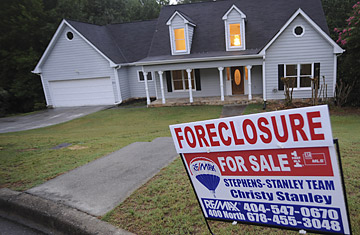
A house for sale in Atlanta
Are your property taxes rising while the value of your house falls? Join the multitudes of Americans who are in the same predicament. In Atlanta, home values have tumbled over the past year by as much as 12%, but an Atlanta Neighborhood Development Partnership study of high-foreclosure areas found that the owners of those properties would have had to pay an extra $70 million in taxes because of overvalued but official appraisals. In states from New York to Arizona, angry citizen groups are lobbying their state legislatures — which are already facing budget shortfalls — to address the discrepancies.
Tax assessors across the country have seen an uptick in the number of homeowners challenging their homes' appraisal value. The Wall Street Journal reported that in St. Tammany Parish, La., 15,000 residents — instead of the usual 500 — requested a review of their 2008 tax bills. And the Cleveland Plain Dealer reported that Cuyahoga County, which has about 1,300 foreclosures a month, saw three times as many appeals in 2007 compared with previous tax cycles. (See pictures of Cleveland's housing crisis.)
Atlanta attorney Edward Lindsey says he saw the writing on the wall when he first ran for state representative in 2004. As he went door-to-door canvassing for votes in one of the city's wealthier enclaves, countless residents told him of paying property taxes that didn't reflect the true value of their house, but a value fueled by an assessment of their neighbor's recent renovation. Lindsey may have felt a little guilty. He and his wife had just completed what he described as "an upgrade" — he tore down one house and replaced it with a larger one — to the property they had lived on for the past 20 years. "It's not fair for [my neighbors] to have their property reassessed because of the renovations we've done," says Lindsey, a Republican legislator since 2005. "Property taxes should be focused on what you invested in the property rather than the unrealized gain, which is subject to wild variations."
Lindsey is one of several Georgia state lawmakers currently calling for property tax reform. It's a mission fueled by head-scratching homeowners who can't fathom why they are paying higher taxes on homes with tumbling prices. However, with at least 44 states facing budget woes in the coming year, it's a movement that, if successful, could make it tougher on states to raise revenues. And yet, with the Georgia general assembly about to start its session next week, Lindsey says he hopes both houses will quickly pass his bill to cap growth in assessments at 3%.
But state senator Vincent D. Fort, a Democrat, believes that in an era of state budget cuts, this is an issue best left to municipal governments. "Municipalities know best what revenues are needed and how they are needed," Fort told TIME. "Those officials, those school boards, those city councils are going to be held accountable by their constituents and [these caps aren't] helpful when state cuts are requiring cities to look at how to raise revenues. Localities need to be able to control their own property tax."
Lindsey, meanwhile, argues that property taxes are a "backdoor tax." "I believe local officials should go to your front door to tell you they need to raise taxes," he says. "There are times when constituents will understand that they need [higher taxes] for better services, and they will adjust."
Already, the push-and-pull of falling revenue based on property taxes, on the one hand, and demand for services, on the other, is convulsing many communities and states. In Decatur, Ga., a suburb east of Atlanta that relies on property taxes for revenue, the city has postponed a vote to annex additional neighborhoods because locals are concerned that annexation will overcrowd schools. In New Jersey, Governor Jon Corzine wants county and municipal governments to forego more than $500 million in pension payments in the coming year as a way of avoiding higher property taxes. And California and Arizona, where property values have tumbled as much as 30%, are faced with borrowing billions of dollars to cure their ailing budgets. "It's not just a problem for folks here," Lindsey says. "It's a problem for folks everywhere."
